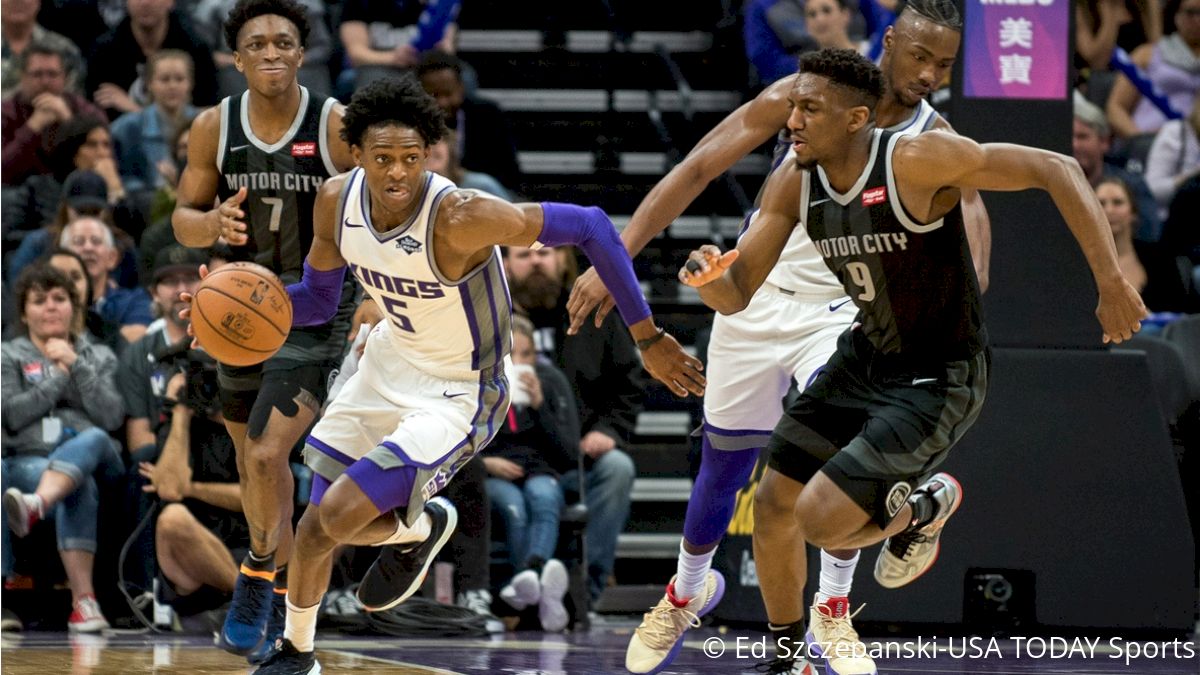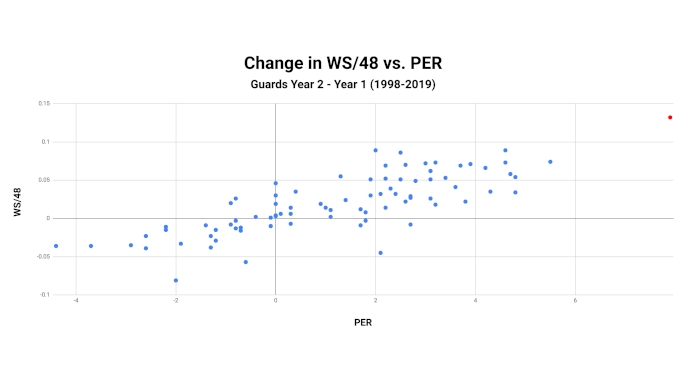De'Aaron Fox's Unprecedented Improvement In Year Two
De'Aaron Fox's Unprecedented Improvement In Year Two
De’Aaron Fox has sprinted past even the wildest expectations, turning the black hole that has been the Sacramento franchise into must-watch TV.

With a 23-21 record and just one game out of the playoff race, the Sacramento Kings have been one of the biggest surprises of this NBA season so far. While the addition of No. 2 overall pick Marvin Bagley and free-agent signings Yogi Ferrell and Nemanja Bjelica have certainly improved the Kings’ depth and allowed them to play with a bit more pace and space, no change has been more significant, or exciting, than the unleashing of De’Aaron Fox.
After a slow rookie season, the Kings preached patience with their young point guard, who showed flashes of potential but looked a bit overwhelmed by the volume of responsibilities required to run an NBA team. Historically, point guard has been one of the positions that takes longest to develop, due to the difficulties in transitioning to the speed and complexity of running an NBA offense. And after the highs and lows of Fox’s rookie season, it appeared the process would be slow, even for the “fastest player in the league.”
But so far, De’Aaron Fox has sprinted past even the wildest expectations in his second season, turning the black hole that has been the Sacramento franchise into must-watch TV. Should we have seen this coming? Is this sustainable? We here at FloHoops decided to look back and see just how out of the ordinary Fox’s second-year leap has been.
We analyzed the stats of all guards drafted in the last 20 years who have played in at least 70 percent of their team’s games in both of their first two seasons and then compared their relative PER (measure of per minute production standardized to an average of 15) and Win Shares/48 (estimate of the number of wins produced by a player per 48 minutes) to see who have had some of the biggest “leaps.” The answer might be surprising.

On the x-axis, we have PER. On the y-axis, we have WS/48. The average change in a guard’s PER from year one to year two is 1.2. The average change in a guard’s WS/48 is .02. That is a healthy degree of marginal improvement that franchises expect when taking changes on young guards. The red dot, way over in the top right corner, leading both statistical categories by a wide margin, with a 7.9 increase in PER and .132 increase in WS/48 is, you guessed it, De’Aaron Fox.
De’Aaron Fox’s leap in his second season tops a list that includes future Hall-of-Famers Chris Paul, Dwyane Wade, Steph Curry and Tony Parker, and it isn’t even close. Leaps like Fox’s as measured by advanced stats like PER seem to also be a good indicator of future success. Second on the list is Dwyane Wade, with a PER increase of 5.5, third on the list is Tony Parker, with a PER increase of 4.4. The difference, among 87 guards who qualified over the past 20 years, between De’Aaron Fox and third place, Tony Parker, is approximately equal to the difference between third place and 44th place.
Fox also doesn’t just stand out from an advanced metric standpoint. His changes from year one to year two are near the top the top of the rankings across a variety of categories, both traditional and advanced:
De'Aaron Fox Year 2 Leap Rankings | ||||||||||||
| FT | FTA | AST | STL | PTS | FG% | 2P% | 3P% | TS% | PER | ORtg | WS/48 | |
| Rank | 3 | 2 | 2 | 1 | 5 | 5 | 11 | 13 | 1 | 1 | 1 | 1 |
Perhaps most impressively, Fox has managed to increase his production, moving from 15.4 to 20 points per 36 minutes, while simultaneously increasing his efficiency across all major statistical categories. A guard whose biggest weakness coming out of college was his jumpshot is now shooting 38 percent from three, up from 30 percent a year ago. He has increased his points per game and assists per 36 minutes without increasing his usage rate. Fox has been using 25 percent of his team’s possessions while he has been on the floor this year, ranking only 65th among active players.
What De’Aaron Fox is accomplishing this season is truly unprecedented in the modern era, and puts his name right alongside some of the all-time greats. He has gone from not even being mentioned in the rookie of the year conversation to cementing himself as a franchise cornerstone in just a matter of months. The only question is whether the fastest player in the league can keep this pace up over the second half of the season.
Fri Lavey is a writer and consultant who studied economics and statistics at Harvard University. He has previously worked as a data analyst for the NBA, the MLB, and the Philadelphia 76ers.